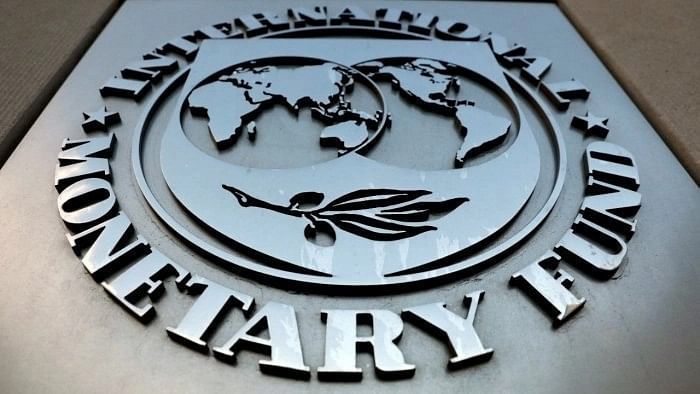
The IMF logo.
Credit: Reuters Photo
Islamabad: The IMF's unscheduled performance review discussions in Pakistan next week will primarily focus on the materialisation of new foreign loans to the country to fill nearly $2.5 billion in external financing gap for this fiscal year, according to a media report.
The International Monetary Fund will assess Pakistan's external financing needs during these discussions, as some planned loans have not yet been secured, according to government sources.
According to The Express Tribune newspaper, led by Nathan Porter, the IMF Mission Chief, the talks will formally begin on Tuesday, with an opening session also planned with Finance Minister Muhammad Aurangzeb.
The mission's arrival in Pakistan is unscheduled, as the first formal review for the release of the second USD 1.1 billion tranche is slated for March 2025.
Pakistan faces delays in obtaining loans from bilateral creditors, complicating efforts to bridge its external financing gap. The Washington-based global lender previously estimated a total USD 5 billion external financing gap for the 2024-2027 period, of which USD 2.5 billion is estimated for this fiscal year.
However, Pakistani authorities claim that the gap will be smaller than projected five months ago, due to improved performance of the external sector.
Pakistan's exports and foreign remittances have been performing better, reducing pressure on the external account. Nevertheless, loans are still needed to repay existing debts, primarily owed to Western financial institutions.
After the IMF approved the USD 7 billion package for Pakistan in September, the country had anticipated raising USD 3.2 billion against the USD 2.5 billion in debt needs. This included a USD 1.2 billion Saudi oil facility.
Five months into the fiscal year, no agreement has been reached on the Saudi oil facility, sources indicate.
Each month of delay reduces the available funds by USD 100 million within the fiscal year. Pakistani authorities remain hopeful of persuading Riyadh to extend the facility. Finance Ministry Spokesperson Qumar Abbasi did not respond to inquiries about the USD 1.2 billion Saudi oil facility's status.
Pakistan is also pursuing a USD 1 billion loan from Dubai Islamic Bank. Additionally, Pakistan has requested China to reschedule USD 3.4 billion in debt extended by China's Export-Import (Exim) Bank. Of this, roughly USD 750 million is due in the current fiscal year; the rescheduling is factored into the external financing calculations, sources said.
Due to its weakened financial position and certain implicit restrictions under the IMF agreement, Pakistan lacks the flexibility to repay Chinese debt.
Out of the total USD 6.5 billion Chinese commercial debt, about USD 3.9 billion is due this fiscal year. The government has managed to roll over a USD 200 million debt that matured in September, but the next USD 1 billion is due in March 2025, with no progress on securing another rollover, according to sources.
The government's USD 3.2 billion plan also included Pakistan's most expensive loan in history, a USD 600 million facility from Standard Chartered Bank. However, following an article in The Express Tribune, the finance minister indicated that this facility would not be utilised, and the IMF distanced itself from this loan arrangement.
The IMF's unexpected visit comes just six weeks after the loan's approval and four months before the planned review, to assess performance on July-September targets and progress in the second quarter from October-December 2024.
Official figures indicate a tax collection shortfall of Rs190 billion over the past four months, with the Federal Board of Revenue (FBR) collecting Rs3.440 trillion against a target of Rs3.632 trillion, despite record-high taxes this year.
Sources say the IMF intends to scrutinise Pakistan's macroeconomic framework projections closely, according to the paper.